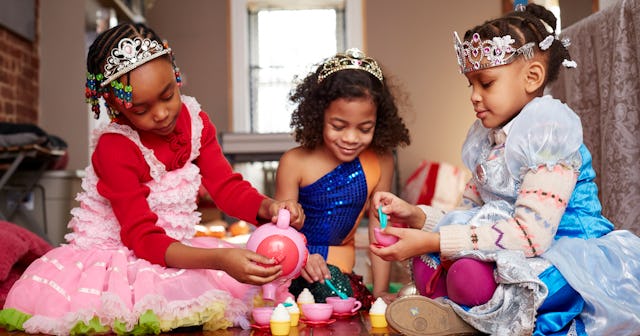Disney Princess Culture Isn't Toxic, Study Says

The ‘princess culture’ debate has been going on for decades, and it looks like we finally have some good news
Disney’s princesses have long been scrutinized for promoting and re-enforcing gender stereotypes. Earlier studies suggested that the heat was well-deserved, but a new study from a Brigham Young University (BYU) developmental psychologist suggests that Disney princesses could have positive impacts as well, including positive body image and a rejection of traits associated with toxic masculinity.
Developmental psychology Sarah Coyne has studied a group of kids from preschool throughout their early adolescences. She surveyed the children about their views on princess stories, along with their views on men and women. She released her first study in 2016, which found a correlation between younger children, especially girls, leaned into gender stereotypes without necessarily picking up on the admirable traits of the princesses, like kindness or braveness.
Her initial study also suggests that despite some of the impossible, Barbie-esque statures of the some of Disney’s heroines, kids’ confidence in their bodies wasn’t impacted.
“We actually found that those who are really into princess culture and who also came from lower-income families tended to have better body image than those who weren’t into princess culture when they were in preschool,” Coyne told KUER, a Utah NPR affiliate.
The good news is, as a developmental psychologist, Coyne was interested in seeing this effect over time, and she continued to survey the 300 children into their adolescence and found some positive results, which were published in the journal Child Development last week. The study found that participants who had a “higher engagement” with princess culture as toddlers, like if they had a favorite or insisted on dressing up like a certain character, had more progressive attitudes about women as tweens and young teens.
“Princess culture gives women key storylines where they’re the protagonist. They’re following their dreams, helping those around them, and becoming individuals who aren’t prescribed a role because of their gender,” Coyne said in a statement, giving a nod to more modern princesses such as Moana and Elsa who represent a new wave of Disney princesses.
Further, Coyne found that girls who were super into princesses as young children were more likely to “view educational opportunities, relationships, and careers as being equally important for women and men.”
Princess Culture has positive impacts on boys, too.
Coyne’s study suggests that Disney heroines also have a positive impact on boys, helping them reject traits of toxic masculinity like bottling up and hiding emotions.
“Boys who are exposed to princess culture earlier in life tend to do a better job expressing emotion in their relationships,” said Coyne. “Rather than shutting down their feelings or feeling like they should fight someone who challenges them, they can express their emotions in non-violent ways.”
Of course, simply popping in a marathon of Disney princess movies isn’t going to teach kids about gender equality.
Coyne emphasizes that these stories alone aren’t going to inform a child’s emotional intelligence and views on gender. She suggests that parents talk to their kids about the characters and what they admire about them.
“Princesses like Moana are full of depth, passion, and goodness. The story isn’t about how she looks, it’s about following your dreams and finding who you are. Parents can take these interpersonal qualities and help their kids grow. We can show them that princesses offer a wide amount of depth beyond appearance,” Coyne said.